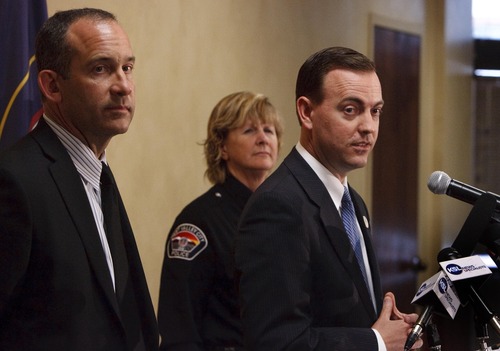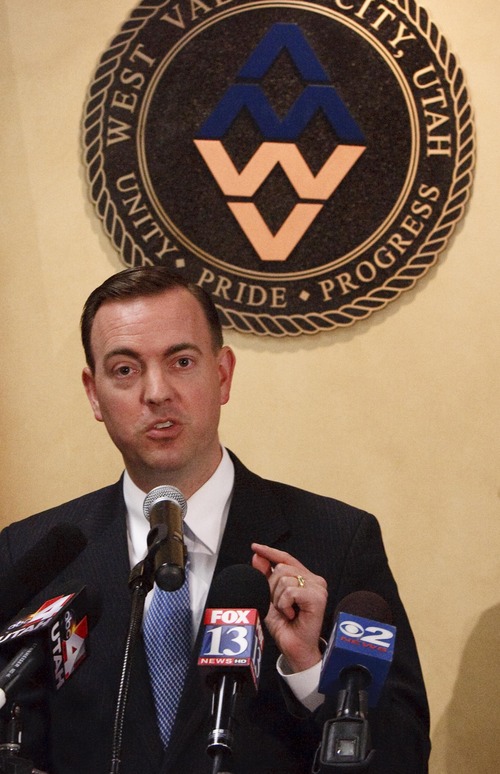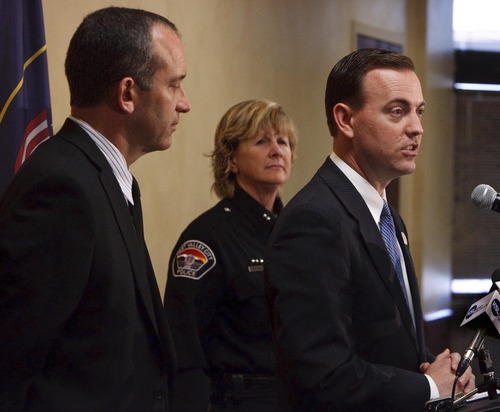This is an archived article that was published on sltrib.com in 2013, and information in the article may be outdated. It is provided only for personal research purposes and may not be reprinted.
West Valley City • Mayor Mike Winder has a problem: his troubled police department. He also has an opportunity: that same embattled police force.
How he handles the controversies over law enforcement's mishandling of drug cases that have led to the dismissal of 88 state cases and 10 federal ones — as well as the criticism of the investigations into the unsolved disappearance of Susan Cox Powell and the shooting death of Danielle Willard — could influence the career path of the ambitious politician who has been touted, at times, as someone who could one day represent the state on a national level.
Will future voters see Winder as a fixer or a failure? Will they see him as someone who can clean up a mess or one who makes it worse?
"On one hand, it's not his job to run the police department day to day," said Matthew Burbank, a University of Utah political science professor. "On the other hand, he can't distance himself from what happened."
Burbank said helping the police department get back on track will be critical in future elections to Winder, who's already been battered by a scandal over his use of the fake identity of Richard Burwash to write newspaper articles about his city's successes.
"There are lots of second acts in politics," he said.
Kevin Fayles, a West Valley City resident who ran unsuccessfully against Winder for mayor in 2009, sees that dual effect in two recent news conferences.
In the first, City Manager Wayne Pyle acknowledged that West Valley City should have been forthcoming to the public about the investigation into the death of the 21-year-old Willard, whom plainclothes police detectives fatally shot in November during a drug-related bust. Pyle was joined at the lectern by acting Police Chief Anita Schwemmer.
In the second, Winder announced his plan to tackle the police problems, including rooting out "any and all impropriety" and establishing stronger independent oversight of the force, while pointing out that crime is going down in his city.
Fayles said Winder should have been at both news conferences.
"Leadership," Fayles said, "demands being present for the difficult times as well as the good times."
—
Lessons learned • Winder, 37, has endured bad times before, and pundits say he suffered political consequences for them.
Critics say Winder, who had a mandate from his citizens with 74 percent of the vote for mayor after four years on the City Council, took his desire to promote a positive image of his city too far.
In November 2011, Winder, then director of public affairs for the public relations and lobbying firm The Summit Group, revealed that he had used the Burwash name to submit articles published in the Deseret News, KSL.com and the community newspaper Oquirrh Times. The stories focused on West Valley City's successes, and a few contained quotes attributed to Mayor Mike Winder.
Many viewed the incident as a reflection on Winder's integrity and judgment, and he soon resigned from The Summit Group. He ran for Salt Lake County mayor last year but lost in the Republican primary, a defeat some believe was caused by his use of the pseudonym.
"I have a deep love for West Valley City," Winder said Thursday. "My children are sixth-generation Winders to live in this city. My pen-name mistake was motivated by my trying to put the city I love in a better light."
Winder declines to say whether he will run for a second four-year term as mayor this year, but the signs are there: He raised more than $50,000 at his annual gala in March for an election campaign chest.
When asked whether the police matter will hurt his political future, he replied, "I hope not. We're doing everything we can to identify what went wrong and make sure it doesn't happen again."
The city set up the Special Review Panel to evaluate the dismissed cases and the City Council created the Police and Public Safety Advancement Task Force to explore best practices involving chain of command and evidence handling.
Council members also have focused on the city's Professional Standards Review Board, a body of six civilians and one police officer that monitors the 180 or so sworn officers. The board does not post agendas, allow the public to attend its meetings or release details about its work.
Under changes mandated by the council, the police department will no longer have a role in appointing board members, a police member will have no vote and a report on the board's activities will be published quarterly.
Lifelong resident Bill Barton said the city was lax in letting the problems with the police force go on for so long. He likes Winder's plan to help straighten things out.
"He's overcome other things," Barton said. "He'll overcome this."
Winder pointed out that under the city's form of government, the mayor and the other six council members appoint a city manager to run operations. The council can make recommendations, but the manager has the authority over city employees.
Margaret K. Peterson, a former City Council member who confirmed Thursday that she plans to run for mayor, said she will not make the police issue the focus of her campaign but believes it will be a factor to voters. The mayor, she said, oversees the whole culture of the city.
"We need to get this resolved quickly," Peterson said, "and we need to make changes from bottom to top."
—
Going forward • Winder said when he and the council members learned about the police problems shortly before they became public, they "wholeheartedly" supported the investigations into the department and demanded swift action.
The mayor acknowledges that some residents might believe there is widespread corruption in the city but said he hopes the majority will realize there are a few "bad apples" and that elected officials are working to resolve any issues.
State Sen. Jim Dabakis, D-Salt Lake City, said the issues have been festering a long time and that Winder can't ignore them.
"When you look at a lot of the problems in West Valley City, you see a lack of leadership," he said. "A strong leader might have prevented the problems you see now."
Others take a different view.
Clayton Simms, a Salt Lake City defense attorney, said Winder should be judged on what steps he took to correct the problems when he learned about them.
Sen. Daniel Thatcher, R-West Valley City, said Winder has been "incredibly effective."
"I don't believe this one issue will overshadow everything he's done," Thatcher said. "I think he's handling it as well as he can from a point of reaction."
pmanson@sltrib.comTwitter: @PamelaMansonSLC —
In the spotlight
Watch Mayor Mike Winder's April 23 news conference: http://bit.ly/14mVL69 —
Police department controversy
Allegations that evidence in West Valley City narcotics cases was mishandled and the shooting death of Danielle Willard during a drug bust have led to:
The dismissal of 98 state and federal drug cases.
The disbanding of the Neighborhood Narcotics Unit and the placement on administrative leave of nine officers.
An internal audit by the police department.
An FBI investigation into whether there was corruption in the narcotics unit and whether there was a cover-up in Willard's death.
The creation of the Special Review Panel to evaluate the dismissed cases and the Police and Public Safety Advancement Task Force to explore best practices involving chain of command and evidence handling.







